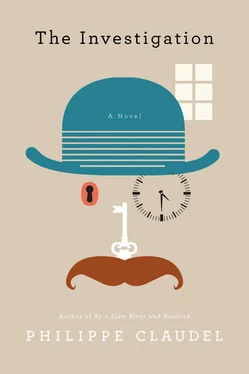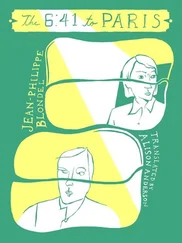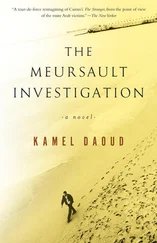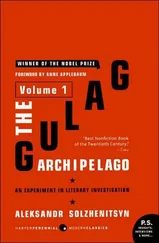“I was only following the line …” the Investigator murmured, as if to himself. He was thinking about the faceless Korean, whose fate the Investigator had just barely escaped.
“The problem,” the woman went on, “is that everyone follows that line without exercising good judgment. If you raise your eyes, you see quite clearly that the line goes straight into a wall. It’s the result of bad planning or a discreet attempt at sabotage; we’ll never know. The Employee who painted the line misunderstood his orders, or maybe he didn’t want to understand them, and, rather than make the line veer off to the right so that it would lead people to my office, he let it go smack into the wall and even continued it up the wall, for close to seven feet — that is, to the highest point his brush could reach — and then he finished off the line with an arrowhead pointing to the clouds. Your case, like the Korean’s, is extreme, but bear in mind that I’ve seen certain individuals approach that wall and try to scale it because they didn’t want to stray from the green line. They tried to climb that wall, even though it’s about sixteen feet high, it offers no handholds, and it’s topped by barbed wire. As a result, they cut their fingers and broke their nails, and to go where? To the sky? You can understand the degree of psychological conditioning people have undergone when you observe them in certain circumstances, like when they’re supposed to obey instructions, advice, or orders.”
This whole conversation was still a little complex for the Investigator, whose badly bruised head had allowed him to grasp some fragments — the line into the wall, the Korean’s death, Level 7 Impediments — and not others, which were too abstruse for him at that moment. “How would you assess my Impediment level?” he asked.
The woman looked at him, palpated his forehead, which made him cry out in pain, took his pulse, closely examined the whites of his eyes.
“Our Impediment scale goes from Level 1, which consists in absenting oneself from one’s work for two minutes to go to the restroom, to Level 7, which designates the irreversible cessation of an individual’s bodily functions. After a cursory examination, and with the obvious stipulation that this assessment cannot be used in a claim proceeding before an insurance company or in a court of law within the framework of a judicial action brought against the Enterprise, I’d say that you are the object of a Level 3 Impediment, but that, I repeat, is not an actual diagnosis. Certain skull fractures, for example, are undetectable in a superficial examination, but that doesn’t stop them from causing a swift death a few hours later.”
The Investigator’s thoughts turned to the Guide, who the Security Officer had told him was the victim of a Level 6 Impediment. Wondering what such an Impediment entailed, the Investigator couldn’t stop himself from asking the woman to define it.
“Cessation of cerebral function.”
The Investigator began to tremble. He felt a knot forming in his throat. What could have happened to the Guide? “Thank you, Doctor,” he groaned.
“Please don’t think I’m reproaching you for your mistake, but I’m not a doctor, I’m a psychologist,” the woman replied with a smile, and as he looked at that smile, it was as if he were contemplating his reflection in a mirror, a reflection of himself with a little lipstick on his lips, lightly made-up eyelids, and rather more hair.
The Psychologist stood up. “I believe you have now recovered sufficiently to follow me. We’re going to my office.”
THE INVESTIGATOR LET HIMSELF be taken by the arm and guided like a sick child. They left the room, which might have been some sort of infirmary. As he walked, he realized he wasn’t wearing his raincoat anymore, or his sweatpants, either; what he had on was a simple hospital gown, salmon in color, made of some light, comfortable material — cotton, maybe Indian cotton, doubtless not silk, such a precious fabric would never be used in manufacturing that sort of garment, but the impression it left on the skin was nevertheless like that left by silk, warm and ethereal — and reaching down to the middle of his thighs. He had the awkward feeling that he was totally naked under the gown, but he didn’t have the nerve to check.
They were stepping warily down a white corridor whose floor, walls, and ceiling seemed to be covered with foam padding, which muffled the sounds of their progress and made walking an activity both delicate and spongy. At the end of about a hundred yards, the Psychologist opened a door on the left. He entered and led the Investigator to a swivel chair, chose for himself a wheeled stool — a rather tall metal object with a seat shaped like a tractor seat, one of those stools that hairdressers use to rotate around their clients — and rolled himself very close to the Investigator.
The office décor presented nothing of interest, or in any case nothing sufficiently arresting for one to pause and describe it. Nevertheless, one item leaped to the Investigator’s eyes — namely, the immense portrait of the Old Man; the face, clothes, and pose, he saw, were identical to those in the photographs on the key ring, in the Hotel room, and in the Manager’s office. Although the Investigator didn’t understand why, this realization terrified him, and his disquiet didn’t escape the Psychologist’s notice.
“Why are you looking at the wall?” he asked.
The panic-stricken Investigator couldn’t detach his gaze from the Old Man’s smile, from his drooping eyelids, whose curves exactly matched those of his mustache, from the light — mocking? cheerful? kindly? appalling? — that burned in his eyes, from his wrinkled, liver-spotted, fissured hands, by themselves a résumé of great age, or from his clothes, which the viewer felt like stroking, and against which he could perhaps snuggle up and fall asleep, so that thus he might obtain forgiveness for his mistakes, for his lies, for his lesser and greater sins.
“That man there …”
“A man? Talk to me about him,” the Psychologist said, having just looked at the wall himself.
“I beg your pardon?”
“You mentioned a man. Who is he?”
“I don’t know.… I don’t know. I have a vague notion.…”
“If it makes you feel any better, so do we all.”
“Is he the Founder?” the Investigator ventured to ask.
Moving like a crab, the Psychologist rolled his stool to one side, placed himself facing the Investigator, and repeated “The Founder?” in a puzzled voice.
“Yes. Is he the Founder?”
The Psychologist hesitated, seemed about to say something, reconsidered, and shrugged. “If you say so! Well, good. Now, provided you have no objection, I’d like us to talk about you. What brings you here?”
The Investigator would have gladly swallowed one or two of his friend the Policeman’s blue-and-yellow tablets, but the medicine bottle, like his discharged cell phone, had remained in his raincoat, and in any case, the bottle was empty. He wondered where his clothes could be. He didn’t miss them very much; the gown he had on was generally much more practical and certainly much nicer; he thought it becoming, and it was as thin and soft as a second skin.
Forgetting his headache and gathering his thoughts, he began to give a summary of his situation to the Psychologist. He started with his arrival in the City, repeatedly stressed his status and his mission, recounted his wanderings in the streets, his sensation of being lost, of being manipulated, the strangeness of the Hotel, the differences in how he was treated from one morning to the next, the Policeman’s hostile and then friendly behavior, the conduct of the Giantess; he talked about the deserted nighttime streets, about his feelings of abandonment and isolation, about the vastness of the Enterprise, which encompassed the entire City and perhaps even the visible world, about the Crowd that inundated the City during the day, impeding the slightest movement, unless you were a policeman, in which case the Crowd became a flock of sheep that a symbolic cudgel blow, a raised hand, a glaring eye sufficed to bring under control, about hostile sandwich-vending machines, about the Exceptional Authorization, about the Manager’s unsuccessful leap over his desk, about the Guide who was also the Watchman, about room 93, which the Investigator had methodically trashed, about the Tourists, the Displacees, the inconstancy of the weather, and the inability of the Hotel’s Architects to design stair risers of uniform height.
Читать дальше












